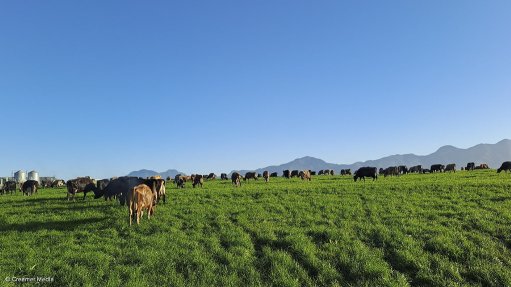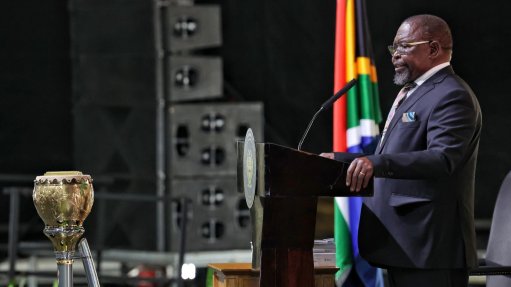Sars revenue boost a result of good luck and not good policy, says BLSA CEO
The announcement last week by the South African Revenue Service (Sars) that it had managed to exceed revised budgets for tax collections, with the collection of R38-billion more than had been estimated in the February Budget for the 2020/21 year, is “very welcome”, says Business Leadership South Africa CEO Busi Mavuso.
The extra collections, she explains, mean government has a “little more breathing room” in getting the country’s debt levels under control, as well as reflecting a better economic performance than had been expected.
However, while the good outcome will help lift sentiment from its “rock-bottom levels”, Mavuso says the collection figure of R1.25-trillion for the year is still R106-billion lower than the R1.36-trillion collected in the previous financial year – a decline of 7.8%.
It is also 12.3% lower than the R1.43-trillion that had been budgeted for the year in February 2020.
Nonetheless, the figures are still a “far better outcome” than the R300-billion decrease in revenue that had been expected at the time of the Covid-19-induced emergency budget of 2020, she says.
However, looking in depth into the Sars numbers, Mavuso reveals that the outcome of higher-than-expected revenue collection was a result of “good luck” rather than an outcome of good policy interventions.
“The surprise positives were driven by higher provisional tax payments and royalty collections from mining companies on the back of a weaker rand and high prices for iron-ore, platinum group metals and gold.”
As such, provisional income tax by the mining sector was 57% higher than the year before.
Mining aside, she also reveals that the larger finance sector experienced a 15.3% reduction in income tax payments as profits collapsed. Manufacturing also fell by 16% and community social and personal services fell by 28.7%.
“The mining sector therefore saved us from a much worse outcome,” Mavuso states.
She also avers that the situation could have been further boosted if policy for the mining sector worked better than it does now.
“Imagine if the 5 000 mining rights applications awaiting approval at the Department of Mineral Resources and Energy had been processed on time. Imagine if long-outstanding revisions to mining legislation and the mining charter had been finalised. The mining sector would have been much bigger than it is and the collections therefore even bigger.”
HANG-UPS
In terms of specific government interventions, Mavuso says there is evidence of “major blows” to tax collection, with excise duties being substantially constrained by the alcohol and tobacco restrictions resulting in a contraction of 31%, with collections R14.6-billion lower than in the year prior.
The biggest fall was in cigarettes, with a 46% decline; even though several studies showed that cigarette consumption did not fall much during the ban as smokers just switched to illicit economy supply chains.
All in all, she says the Sars figures reinforce a point Mavuso has often made – that South Africa needs to get companies working better. “That requires creating a conducive environment – reducing red tape and making it easier to operate.”
She adds that if companies find it faster and simpler to navigate government bureaucracy, they can become more responsive to opportunities, investing and growing the economy, boosting the taxes they pay as a result.
Further, Mavuso says the list of things to be done is long, but starts with some relatively easy interventions. “First, make it easier for companies to generate their own electricity and resolve the chronic energy insecurity that currently bedevils operations.” She suggests that companies should be permitted to build plants up to 50 MW without a licence.
Secondly, Mavuso says it needs to be made easier to hire skilled foreigners to replace those lost to the skills exodus. “The reality is that many companies cannot find the people they need to operate the expanded capacity they could be creating, so they do not invest.”
Thirdly, she says the auctions of communications spectrum need to be done so that network providers can invest in expanding capacity and increasing broadband availability in the economy.
Article Enquiry
Email Article
Save Article
Feedback
To advertise email advertising@creamermedia.co.za or click here
Announcements
What's On
Subscribe to improve your user experience...
Option 1 (equivalent of R125 a month):
Receive a weekly copy of Creamer Media's Engineering News & Mining Weekly magazine
(print copy for those in South Africa and e-magazine for those outside of South Africa)
Receive daily email newsletters
Access to full search results
Access archive of magazine back copies
Access to Projects in Progress
Access to ONE Research Report of your choice in PDF format
Option 2 (equivalent of R375 a month):
All benefits from Option 1
PLUS
Access to Creamer Media's Research Channel Africa for ALL Research Reports, in PDF format, on various industrial and mining sectors
including Electricity; Water; Energy Transition; Hydrogen; Roads, Rail and Ports; Coal; Gold; Platinum; Battery Metals; etc.
Already a subscriber?
Forgotten your password?
Receive weekly copy of Creamer Media's Engineering News & Mining Weekly magazine (print copy for those in South Africa and e-magazine for those outside of South Africa)
➕
Recieve daily email newsletters
➕
Access to full search results
➕
Access archive of magazine back copies
➕
Access to Projects in Progress
➕
Access to ONE Research Report of your choice in PDF format
RESEARCH CHANNEL AFRICA
R4500 (equivalent of R375 a month)
SUBSCRIBEAll benefits from Option 1
➕
Access to Creamer Media's Research Channel Africa for ALL Research Reports on various industrial and mining sectors, in PDF format, including on:
Electricity
➕
Water
➕
Energy Transition
➕
Hydrogen
➕
Roads, Rail and Ports
➕
Coal
➕
Gold
➕
Platinum
➕
Battery Metals
➕
etc.
Receive all benefits from Option 1 or Option 2 delivered to numerous people at your company
➕
Multiple User names and Passwords for simultaneous log-ins
➕
Intranet integration access to all in your organisation

















